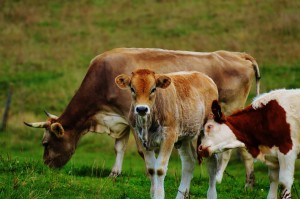No, veganism doesn’t require destroying the Amazon, and no, farmers’ “love” for animals doesn’t justify killing them.
The Guardian published an article titled Cows are loving, intelligent and kind – but we should still eat them. It follows Rosamund Young, a farmer who wrote The Secret Lives of Cows. She bonds with her cows, observes the richness and complexity of their social and inner lives, and even provides this memorable quote “The animals themselves are by far the most qualified individuals to make decisions about their own welfare.” She also brings her cows to the slaughterhouse, despite this being the most extreme and violent opposition possible to the decisions that cows would make for their own welfare.
 This trope of the farmer who loves their animals and has a zen-like maturity about death has been fed to us for a loooong time. Already in 2000, I remember meeting a guy who, upon learning I was vegan, told me he had been vegan for a while. He had started to eat meat again when he met a farmer who really, really loved his animals – but would kill and eat them. He figured that if the farmer, who really, really loved his chickens, still ate them, it was a green light for him to also eat animals. We’re supposed to see farmers as the example to follow, since they are actually in close communion with animals whereas us urban folks have led a disconnected life of Disney movies and supermarket food.
This trope of the farmer who loves their animals and has a zen-like maturity about death has been fed to us for a loooong time. Already in 2000, I remember meeting a guy who, upon learning I was vegan, told me he had been vegan for a while. He had started to eat meat again when he met a farmer who really, really loved his animals – but would kill and eat them. He figured that if the farmer, who really, really loved his chickens, still ate them, it was a green light for him to also eat animals. We’re supposed to see farmers as the example to follow, since they are actually in close communion with animals whereas us urban folks have led a disconnected life of Disney movies and supermarket food.
It would be just as ludicrous to look to men who beat and rape their wives as experts on the validity of women’s emancipation or on how to treat women. They live with them right? And they love them. So if they think patriarchy and male domination of women is ok, then it is. There is so much to deconstruct here in the concept of “love” when applied by a dominant class, but what I want to comment on is the soy – yet something else that is peddled out like truth again and again.
Rosamund Young justifies killing animals because “Britain’s climate and geography make meat production the only truly sustainable land use on its grasslands. Her slopes are too steep to grow crops and vegan diets dependent on imported soya beans from ex-rainforests don’t appear to be sustainable”.
First, vegan diets do not necessarily depend on soy. I spent most of my years as a vegan living in Switzerland and for the most part I ate very little soy. When I did, it was not imported from monocultures in South America; it was organic soy that was grown in Europe. When small farmers and other anti-vegans of that milieu speak of the evils of soy in the Amazon, they conveniently omit that most of that soy goes to feed cattle. Granted, they are not advocating for European cows to be raised on soy either, but that is the inevitable result of the consumption levels in the West today. Grass-fed “beef” is land-intensive. Its proponents sometimes give lip service to the idea of decreasing meat consumption but never center that message in their work.

Going back to soy, people love to wag the finger at vegans but genetically engineered soy is ubiquitous in processed foods consumed by non-vegans. On the other hand, even in the United States, many of the soy products marketed specifically to vegans are non-GMO. And it’s not like pulses don’t grow in the UK. Before they were snubbed as low-class, beans and peas were staple British foods. They’re still grown – now as feed for cattle and for export. Britain is one of the largest exporters of fava beans and Egypt, of all places, is one of its main markets. It’d be wiser for the British to learn to make the delicious Egyptian ful medames and keep their fava beans at home.
You can run around in circles justifying cruelty, but the litmus test is this: would you be ok with dogs being raised and slaughtered like cows? If not, it befalls you to explain why you draw a line between cows and dogs.
There are plenty of veganic growers in the UK, in fact I’ve been told that one of the reasons veganics are more accepted and developed in the UK than in the US is precisely because of the relative lack of land. I hope to see the Guardian start covering their proposal for a compassionate and sustainable food system.
Visit Veganic World for interviews with veganic farmers.
Read my short Defense of the Humble Bean.
